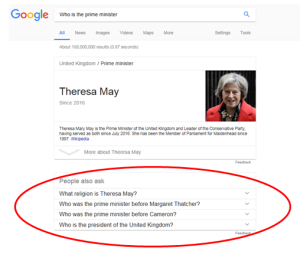We regularly report on changes to the Google search engine. In the past these have included things like the way results to keyword searches are returned, algorithmic changes and updates, or mere changes to Google’s interfaces to help push or promote something new. Whatever it is there is a central point to all scenarios. With each change the aim is to make things much easier for the searcher and to deliver higher quality, faster results which are most importantly presented with the best accuracy.
Google realises that when people search things (especially when this is concerning something broad rather than a target specific company or product,) there is scope within to be ‘outside the box.’ This is similar to when percentages or calculations are made. There is an accepted ‘degree of tolerance’ – that figures could be a little either side. The people also ask box is quite similar. It recognises that sometimes one search might bring about another search which is far more accurate or closer to what the user was actually looking for in the first place. This can be brought about in a number of ways. E.g:
1) The initial search was a stepping stone in a generalised search.
2) The initial search gave results which encouraged the user to search again or refine their target to get closer to the result etc.
This is where people also ask comes in. The said mentioned is a box which appears with many (but importantly as at the time of writing not all) Google searches. It offers a slightly different angle on the original search that you have made, by giving you indications of other ways people have asked what you have, or, closely related things. This is seen almost as an addition to the featured snippets section with the box appearing after featured snippets has been shown.
In the example below you will see this illustrated far more clearly:

We view this as a positive and helpful change, but moreover a logical addition to the search facility. Generally we know that if someone is looking for a specific company, website or product, it make sense they will go to it directly and they don’t need to search for it beforehand. Outside of this things are a little less rigid as people are more likely to accept diverse results so long as they are related to the term that has been searched – thus this is where the degree of tolerance (and for digital marketing purposes the people also ask feature) comes in.
It is not currently clear whether this change is temporary, a trial or here to stay. It will be very interesting to follow to see how it affects peoples resultant search behaviour and whether this brings up leads and results that might otherwise have not been seen or discovered.
To talk to us about any aspect of digital marketing visit our contact page now.
